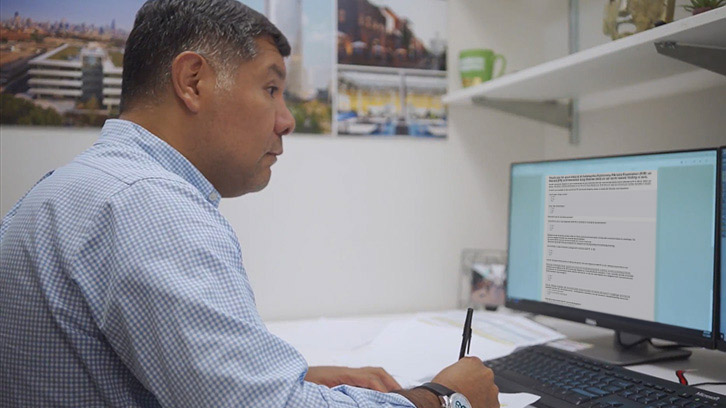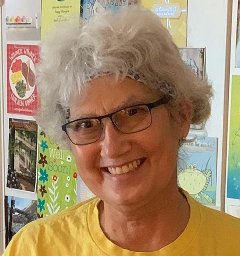PFF Community Registry

Be a part of the solution. Join the PFF Community Registry!
The PFF Community Registry is a series of surveys for all community members affected by pulmonary fibrosis (PF) or interstitial lung disease (ILD). Each case and experience is unique and much about PF and ILD remains unknown. The PFF Community Registry seeks to change that. Knowledge is the first step in understanding how to positively help all who are impacted by these diseases, and your responses to our surveys can help researchers get closer to a cure.
Eligible enrollees include:
- Patients living with pulmonary fibrosis or interstitial lung disease
- Lung transplant recipients who have had PF or ILD
- Caregivers and biological family members of patients with PF or ILD, including those who have passed away
Why join?
The PFF Community Registry enables researchers and health care providers to get closer to a cure for PF and ILD. Your survey responses will be used for scientific analysis in attempts to better understand how PF and ILD progresses over time and responds to treatments and how the disease affects individuals. The more individuals who enroll and provide responses, the more answers we can find. The information collected helps us to contribute tangible, positive change and improvements in research, advocacy, education and practice to help us find a cure.
Join now!
Sign back in if you already enrolled
What participants are saying
Take it from our current enrollees — your participation matters! We welcome patients with PF and ILD, including those who have received a lung transplant, as well as their caregivers and family members, to participate in the surveys via the PFF Community Registry.

Alay Kapwa is a Filipino way to be an active participant in the PFF Community Registry. In essence, it means I am actively offering many ways that I can share and give a helping hand to others in the community.
BO PUNZALAN
Patient with IPF

I’m all about trying to find a cure, so I signed up for the PFF Community Registry as a lung transplant recipient. I’m lucky to get a transplant, but so many of us still need a cure.
MELISSA WHEELER
Lung Transplant Recipient, Former Ironman Athlete

I know the power community has. And if we’re all able to come together and join this registry to offer our insights, that is where the real power lies. We need all of the voices to be able to answer the questions that we have.
SAMANTHA KAGEL
Caregiver
Read the PFF Registry Annual Report
In this report, we showcase the latest research and accomplishments from the PFF Community Registry. To read it, we recommend using a a desktop computer. Use the arrows on the left and right to flip through the pages on the interactive reader below.

What is a registry?
A registry collects and tracks information about the health status of patients and the care they receive. A registry also collects information from caregivers, family members, and others who contribute to the care and outcomes of patients. Unlike a clinical trial where subjects must follow a specific treatment protocol, a registry does not prescribe what should be done or require additional medications or visits. It simply captures real-world data to help researchers learn about actual care patterns, observe subjects, and measure and improve quality of care. Researchers can request access to this information to evaluate contributing factors, treatment outcomes, and more.
Our program enables researchers to explore what treatment strategies work best for patients and to find new ways to prevent, diagnose, treat, and potentially cure pulmonary fibrosis.
How long will it take me, and is it safe and secure?
Enrollment
Your enrollment in the PFF Community Registry will take about one hour to complete. During enrollment, you’ll answer simple questions about your experience, including demographics, diagnosis, education and employment, environmental exposures, and more.
Once enrolled, you will receive a follow-up survey every six months. Each one takes about an hour or less to complete, and they don’t need to be completed in a single sitting. Just save your answers, then return when you are ready to finish it!
Ultimately, your participation will take about two hours of your time per year. If you wish, you may also complete optional periodic surveys. You can decide whether or not to allow researchers to contact you for additional studies such as clinical trials.
Security
The PFF Community Registry is hosted on “myREDCap Cloud,” a platform that allows participants to enter their information via a secure, HIPAA-compliant, online portal. The PFF Registry database is highly secure, using the same technology trusted by doctor’s offices, hospitals and clinical trials worldwide. How much information you want to share with researchers is up to you. The Pulmonary Fibrosis Foundation Registry considers the protection of your privacy to be one of our most important responsibilities. We have set up strict protocols to protect your personal information.

How do I enroll?
Getting Started
The PFF Community Registry is entirely online. You can enroll from anywhere! We recommend using a desktop computer. Your full enrollment in the PFF Community Registry will take about one hour. During enrollment, you’ll
answer simple questions that you already know the answers to. Topics include your experience, including demographics, diagnosis, education and employment, environmental exposures, and more.
To participate in the PFF Community Registry,
you will create your own myREDCap Cloud account free of charge. myREDCap Cloud allows participants to enter their information via a secure, HIPAA-compliant, online portal.
Signing the consent form
You will receive the consent form and will be prompted for your digital signature during the enrollment process.

Researchers: Submit a proposal!
The PFF Registry serves as a resource to stimulate research and assist in clinical trial recruitment. Deidentified clinical data, biosamples, and HRCT scans from the former PFF Patient Registry are available for use by clinical and translational investigators in academia and industry.
What researchers are saying
The impact of the PFF Community Registry cannot be underestimated. Researchers need enrollees in order to make new discoveries and find a cure for pulmonary fibrosis. By joining the PFF Community Registry, you’ll be giving researchers the data they need. The more participants there are, the more valuable the data will be to researchers.

A clinical registry representing a broad range of ILD is a crucial first step toward improving care. We're hopeful that the PFF Registry can provide longitudinal information to help us optimize future clinical trial design and clinical decision making to improve treatment options.
BONNY WANG, MD
University of Michigan

As a young researcher, I deeply appreciate the participation of patients and their families. We are trying to understand and explore outcomes that are meaningful to patients, and we can only make progress with patient participation, so we're very grateful.
JOHN KIM, MD, MS
Columbia University

There is no question that the Registry allows us to impact the lives of our patients and future patients in a positive way because it allows us to ask and perhaps answer essential questions in PF.
AYODEJI ADGUNSOYE, MD, MS
University of Chicago
Frequently asked questions
Click on the question to view the answer. If you don't see your question answered, visit the complete list of FAQs.
Flyers
Want flyers for your support group or office? Download them below!
